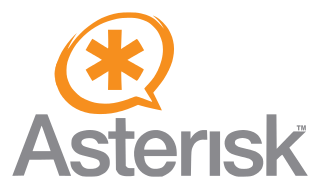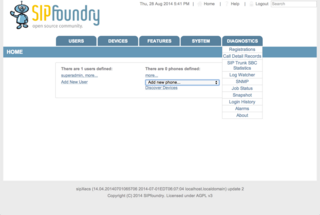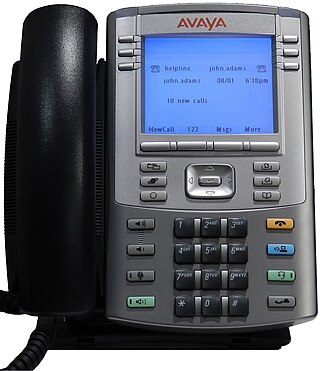A voicemail system is a computer-based system that allows callers to leave a recorded message when the recipient has been unable or unwilling to answer the phone. Calls may be diverted to voicemail manually or automatically. The caller is prompted to leave a message and the recipient can retrieve the message at a later time.

Aastra Technologies Limited, formerly headquartered in Concord, Ontario, Canada, made products and systems for accessing communication networks, including the Internet. Its products included residential and business telephone terminals, screen telephones, Enterprise private branch exchanges (PBX), network access terminals and high-quality digital video encoders, decoders and gateways. Residential telephone equipment was sold in the United States as Bell equipment by Sonecor brand, which represented Southern New England Telecommunications.

Asterisk is a software implementation of a private branch exchange (PBX). In conjunction with suitable telephony hardware interfaces and network applications, Asterisk is used to establish and control telephone calls between telecommunication endpoints such as customary telephone sets, destinations on the public switched telephone network (PSTN) and devices or services on voice over Internet Protocol (VoIP) networks. Its name comes from the asterisk (*) symbol for a signal used in dual-tone multi-frequency (DTMF) dialing.
Broadvoice is a privately owned company headquartered in Northridge, California. They provide Voice over IP (VOIP) cloud-based telecommunications services to small, medium, and enterprise businesses in the United States. Broadvoice offers telephone services, unified communications as a service (UCaaS), SIP Trunking, telecommunications network and security, along with virtual call centers, so business customers can use voice and video communications via a broadband Internet connection or cellular phone.

SipXecs is a free software enterprise communications system. It was initially developed by Pingtel Corporation in 2003 as a voice over IP telephony server located in Boston, MA. The server was later extended with additional collaboration capabilities as part of the SIPfoundry project. Since its extension, sipXecs now acts as a software implementation of the Session Initiation Protocol (SIP), making it a full IP-based communications system.
Meridian Mail is one of the early all-digital voicemail systems, running on Meridian1 / SL-1 digital PBX systems from Northern Telecom.

Nortel Meridian is a private branch exchange telephone switching system. It provides advanced voice features, data connectivity, LAN communications, computer telephony integration (CTI), and information services for communication applications ranging from 60 to 80,000 lines.

The Nortel Norstar, previously the Meridian Norstar, was a small and medium-sized business digital key telephone system introduced by Nortel and later sold to Avaya. It featured automatic call distribution, and supported up to 192 extensions. In the United Kingdom it was sold by British Telecom, rebadged as the BT Norstar.
Selsius Systems was a telecommunications company in Dallas, Texas that developed and marketed some of the first IP telephony gear. It was co-founded by Richard Platt and David Tucker. Selsius was incorporated in 1997 and acquired by Cisco Systems in November, 1998.
Unified communications (UC) is a business and marketing concept describing the integration of enterprise communication services such as instant messaging (chat), presence information, voice, mobility features, audio, web & video conferencing, fixed-mobile convergence (FMC), desktop sharing, data sharing, call control and speech recognition with non-real-time communication services such as unified messaging. UC is not necessarily a single product, but a set of products that provides a consistent unified user interface and user experience across multiple devices and media types.

Avaya IP Phone 1140E in telecommunications is a desktop Internet Protocol client from 1100-series manufactured by Avaya for unified communications. The phone can operate on the Session Initiation Protocol (SIP) or UNIStim protocols. The SIP firmware supports presence selection and notification along with secure instant messaging. This device has an integrated 10/100/1000BASE-T auto-sensing Ethernet switch with two ports and an integrated USB port, and is Bluetooth capable. The SIP version of this phone has full IPv6 functionality and only requires 2.9 watts of power.
The United States Department of Defense (DoD) Internet Protocol version 6 (IPv6) product certification program began as a mandate from the DoD's Assistant Secretary of Defense for Networks & Information Integration (ASD-NII) in 2005. The program mandates the Joint Interoperability Test Command (JITC) in Fort Huachuca, Arizona, to test and certify IT products for IPv6 capability according to the RFCs outlined in the DoD's IPv6 Standards Profiles for IPv6 Capable Products. Once products are certified for special interoperability, they are added to the DoD's Unified Capabilities Approved Products List for IPv6. This list is used by procurement offices in the DoD and the U.S. Federal agencies for ongoing purchases and acquisitions of IT equipment.
The Innovative Communications Alliance (ICA) was a telecommunications alliance between Microsoft and Nortel, created in July 2006, to co-develop, integrate, market, sell, and support unified communications products. The goal of the alliance is to make integrated hardware and software solutions that join together voice, video, and data communications without requiring gateways or middleware. Microsoft and Nortel share developing technologies and patents for unified communications products.
Objectworld Communications Corp., formerly ObjectWorld Inc, was a privately held company that provides unified communications software to small- and medium-sized businesses. Objectworld was acquired by Huntsville, Alabama-based ADTRAN Inc.
Unify is a Mitel company headquartered in Munich, Germany and is present in over 100 countries. It provides software-based enterprise unified communications including voice, Web collaboration, video conferencing and contact center, networking product and services.
CT Connect is a software product that allows computer applications to monitor and control telephone calls. This monitoring and control is called computer-telephone integration, or CTI. CT Connect implements CTI by providing server software that supports the CTI link protocols used by a range of telephone systems, and client software that provides an application programming interface (API) for telephony functions.
Aculab is a privately held, UK-based limited company that was founded in 1978. With headquarters and R&D facilities located in Milton Keynes, UK, and its branch office is in Norwood, Massachusetts, USA.
Ingate Systems AB is a Swedish company that sells data network security and telecommunication equipment. The company primarily provides SIP Trunking of IP PBX:s on the US market. It is associated with sister company Intertex Data AB.
Equiinet is a privately held company based in Las Vegas, Nevada. The company is the manufacturer of voice and security appliances and provides telecommunications, cloud services, and VoIP services.






